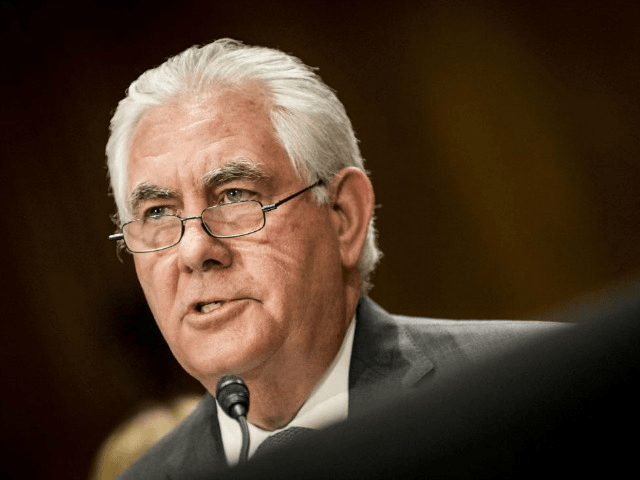The Global Times, a newspaper published by the government of China, has lauded Secretary of State Rex Tillerson’s remarks that the United States does not seek an end to the brutal communist regime of Kim Jong-un in North Korea and would prefer dialogue with it.
In a press conference Monday, Tillerson stated, “We do not seek a regime change, we do not seek the collapse of the regime, we do not seek an accelerated reunification of the peninsula, we do not seek an excuse to send our military north of the 38th Parallel.” Instead, he claimed the United States was “trying to convey to the North Koreans: We are not your enemy. We’re not your threat. But you are presenting an unacceptable threat to us, and we have to respond.”
“We hope that at some point they will begin to understand that, and we would like to sit and begin to have a dialogue with them about the future that will give them the security they seek,” he concluded.
Tillerson did not mention the human rights atrocities for which the Kim regime is responsible, including the mass starvation of its civilians; gory executions of anyone found in possession of Western media, Christians, or political opponents; or the imposition of a rigid caste system that keeps millions from ever seeing Pyongyang if their parents or grandparents did not vow loyalty to the Korean Workers’ Party.
China, North Korea’s main ally and largest trading partner, appears pleased by Tillerson’s remarks, which set a much more conciliary tone than those by other administration officials including UN Ambassador Nikki Haley and President Donald Trump.
In a column praising Tillerson for his “courage,” the Global Times argued, “Many Americans would think Tillerson is showing weakness, but we see his statement as the most courageous expression from Washington regarding the Korean Peninsula issue.”
“Washington should show goodwill to Pyongyang, not through diplomatic rhetoric, but through sincere actions,” the column suggested. “The US and South Korea should respect the national path North Korea has chosen and help North Korea remain stable and develop its economy. When Pyongyang can feel this goodwill, it will have fewer motives to develop nuclear and missile technology.”
Chinese Foreign Minister Wang Yi issued similar comments at a press conference following Tillerson’s remarks, stating that China “attached great importance” to his words and urged the United States to adopt “actual policy towards North Korea,” without elaborating.
“Regarding North Korea’s recent missile launch, once again in violation of UN Security Council resolutions, China has already clearly expressed our opposition,” Wang insisted, a response to increased pressure from the White House on China. China accounts for up to 90 percent of North Korea’s foreign trade and, as a permanent member of the UN Security Council, has played a significant role in vetoing action that could further restrict the North Korean regime’s moves towards acquiring a nuclear weapon.
Not all wings of the Chinese government appear to agree on Tillerson. The People’s Daily, another state media outlet, noted Tillerson’s comments, remarking, “obviously, such statements are not credible to North Korea and do nothing to end the vicious cycle.”
The North Korean government does not appear to have responded internationally to Tillerson’s comments, and its major media outlets continue to churn out the usual vitriol against the United States.
“The U.S. sanctions are the harshest ones baffling human imagination. The U.S. has used its vassal forces and even riff-raffs to tighten the sanctions and blockade of the DPRK,” a column published in the Rodong Sinmun, the state newspaper, read Thursday. “Conservatives of the U.S. are still crying out for sanctions and blockade against the DPRK as they have neither ability to judge reality nor sound reason. It is no more than the last-ditch effort of those doomed.”
Tillerson is scheduled to travel to the Philippines this week for a meeting of the Association of Southeast Asian Nations (ASEAN), to which North Korean foreign minister Ri Yong-ho has also been invited. The State Department believes that Ri will not find much support among the congregating nations, according to Acting Assistant Secretary Susan Thornton.
“What we would expect to see this year at the meeting would be a general chorus of condemnation of North Korea’s provocative behavior and pretty serious diplomatic isolation directed at the North Korean foreign minister,” Thornton told reporters during a telephone briefing this week.

COMMENTS
Please let us know if you're having issues with commenting.